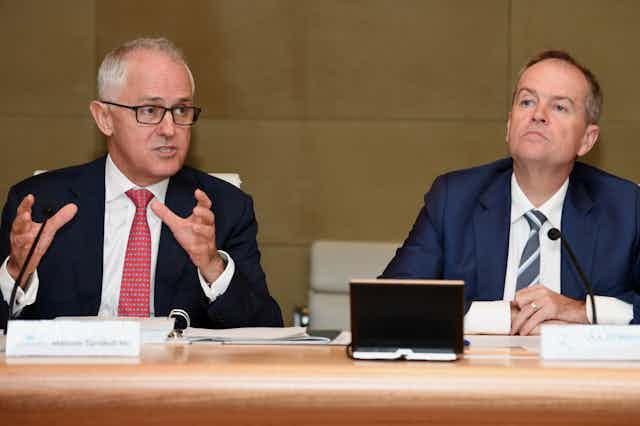Opposition Leader Bill Shorten has called for a pre-election agreement between government and opposition that whichever side wins will hold a referendum for fixed four-year terms.
Soon after Shorten, interviewed on the ABC’s Insiders, put up his proposal on Sunday morning, Malcolm Turnbull rang him on various matters.
The prime minister’s office said that Turnbull had said he was interested in talking with Shorten about four-year terms, while noting there were a lot of complications.
But it denied suggestions Turnbull had given to bipartisan support to Shorten’s proposal. Labor insists it did not suggest that Turnbull had given bipartisan support.
To pass, a referendum would have to get majority support, plus a majority in four of six states.
History shows the difficulty of passing referendums; the prospects are considered hopeless without bipartisan support. Currently there is bipartisan backing for a referendum on Indigenous recognition but this has been delayed and derailed.
The present federal term is three years, with the prime minister having discretion on when to call the election. Shorten said the federal political system seemed “out of whack in that everything is so short term”, with the average term being two-and-a-half years rather than three.
“We need both Labor and Liberal to co-operate on four-year terms,” Shorten said. “Governments can be more daring and more determined if they’re not constantly thinking about the next election,” he said. “What this country needs is long-term policymaking.”
He would be prepared to come to an agreement with Turnbull that whoever won the election, the government and opposition would put an agreed change to the Constitution for four-year terms to the people.
On the tricky question of the Senate terms, which are six years at present, he said that could be worked out if there was agreement on four-year terms.
“It shouldn’t be a deal-killer in my opinion,” he said.
While four-year terms have substantial backing in the business community and elsewhere and operate at state level – Queensland last year passed a referendum for a four-year term – dealing with Senate terms is a central problem in winning support.
Eight-year Senate terms would not be publicly acceptable, and a move to four-year Senate terms, with all senators facing the people at each election, would be unlikely to be embraced by the Coalition.
In 2002, Turnbull backed longer terms while saying the real issue was getting bipartisan support. When opposition leader in 2008, he said the then NSW Labor premier, Nathan Rees, was “exhibit A in the case against fixed four-year terms”.

